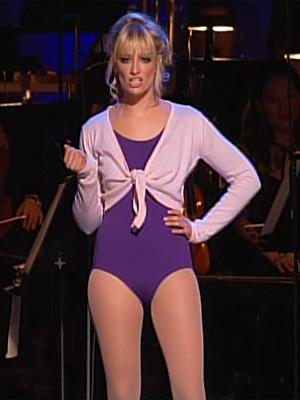As one of its last acts of 2012, PBS presented a Live from Lincoln Center tribute to Marvin Hamlisch — a concert that timidly took the coward’s way out, and doesn’t bode well for 2013…
The live TV broadcast, planned as a New Year’s Eve celebration of the composer’s work and continued as a posthumous salute after he died suddenly in August, was a mostly marvelous overview of the work of Marvin Hamlisch. When you can get Audra McDonald, Kelli O’Hara and Megan Hilty to combine forces to sing on the same stage, you’ve got a TV special that’s truly special.
Hamlisch wrote the music for Broadway’s A Chorus Line and Sweet Smell of Success, “The Way We Were” for the Barbra Streisand movie of the same name, and repopularized Scott Joplin by using his ragtime music in the film The Sting. In addition to host McDonald and singers O’Hara and Hilty, others gathering December 31 to perform the works of Hamlisch, backed by the New York Philharmonic under the baton of Paul Gemignani, included Josh Groban, Raul Esparza, Michael Feinstein, and current Annie star Lilla Crawford.

There also was someone making her New York stage debut: Beth Behrs, known to CBS viewers as the blonde half of the 2 Broke Girls sitcom. She was dressed in the warmup clothes proper for someone performing a song from A Chorus Line (the mega-hit musical with music by Hamlisch, lyrics by Edward Kleban), and dove confidently into her version of “Dance: Ten; Looks: Three,” a comic song about a Broadway hopeful who reveals, in song, that her audition evaluations were enhanced after she was — after she paid for cosmetic surgery to add shape to her “orchestra and balcony.”
Except — and this is the crushingly depressing part — Live from Lincoln Center, because of either an edict from above or a self-censoring fear of Federal Communications Commission repercussions, concocted a way to stop Behrs in her tracks before she could sing, on New Year’s Eve on PBS, the lyrics that helped win A Chorus Line the Pulitzer Prize in 1975.
After Behrs recounted swiping the judges’ dance card assessing her talents as “Dance: Ten” and “Looks: Three” (hence the song’s title), she sang the lyrics “left the theater / and called the doctor / for my appointment to buy…”
But before she could finish the last line of that verse, much less sing the next line – “Tits and ass” – host McDonald scurried over in a pretend panic, to explain that Behrs couldn’t sing the lyrics as written. The second part was okay, but not the first.
“What am I gonna do?” Behrs asks, panicked. “That’s the whole song! The whole song’s about —”
“I know, I know. But this is PBS. It’s Big Bird.”
Big laugh.
“Well, what if I just did the song, and we can bleep it out later?”
“Honey, honey, no. This is live.”
“Live? Live? Nobody told me it was live…
“What am I gonna do, Audra? It’s been a dream of mine to sing on stage in New York my whole life!”
“I know, honey. You’re just gonna have to figure it out.”
“Oh, sure. You got to sing ‘The Way We Were.’ How would you feel if they told you you couldn’t sing the word ‘Way’ or the word ‘Were,’ huh?”
But, like a trouper, Behrs picks up where she left off — substituting a soundalike word each time she’s supposed to sing “Tits.” The variations, over the course of the song, included:
“Schlitz and ass.” “Grits and ass.” “You’re all looking at my bits now, aren’t you?”
“Spritz and ass.” And so on, with each variation diluting the song a little more.
This is a song performed on stage, thousands of times, during the Ford administration — yet even in the context of a New Year’s Eve salute to a dead composer, someone deemed it unfit to perform intact 37 years later. On PBS.
Who, exactly, was envisioned as the possible complainant in this case? Who would be sophisticated enough to watch PBS on New Year’s Eve, yet thin-skinned enough to complain to the FCC about a lyric written the same year as “Love Will Keep Us Together” and “Rhinestone Cowboy”?
Just a few years earlier in the Seventies, George Carlin introduced his now-immortal 1972 monologue about the “Seven Words You Can Never Say on Television.” The seventh word — one, apparently, still as forbidden as the others, at least on broadcast television — was tits.
Schlitz, though, is entirely okay.
I expected more from PBS.
But after every cowardly move such as this, I wonder why I still do…